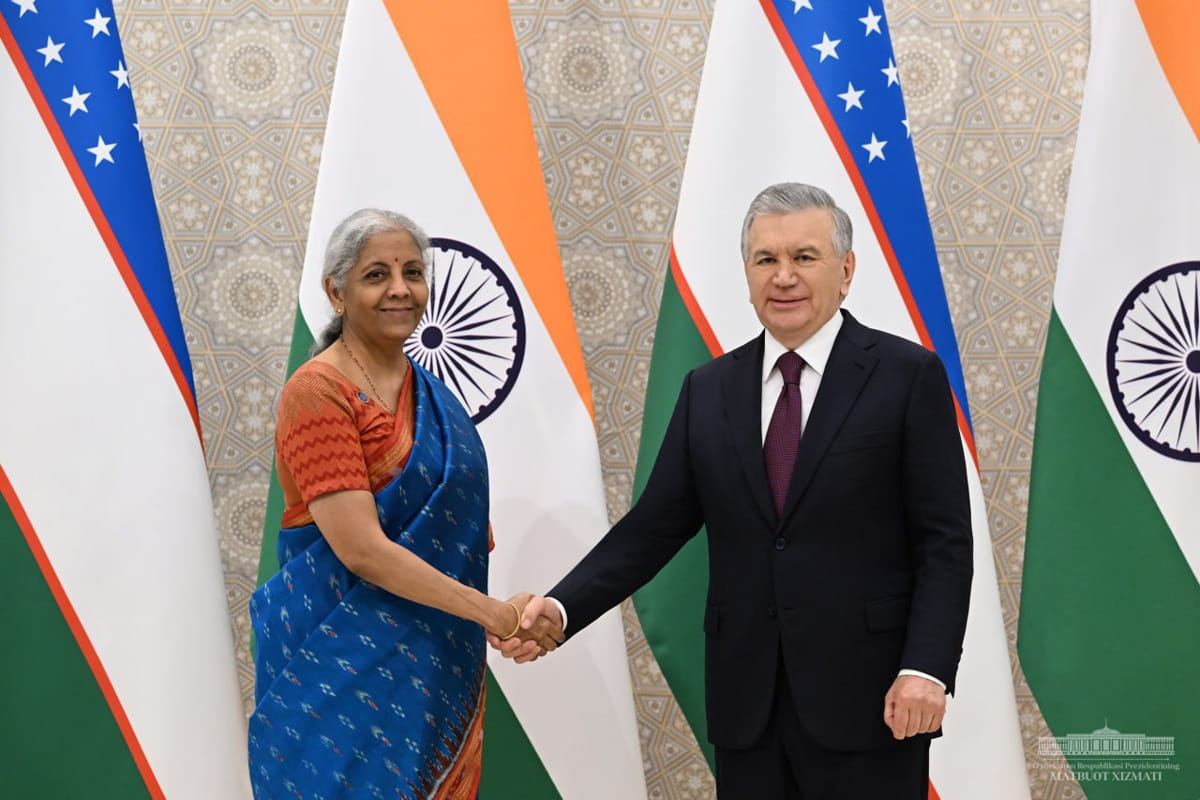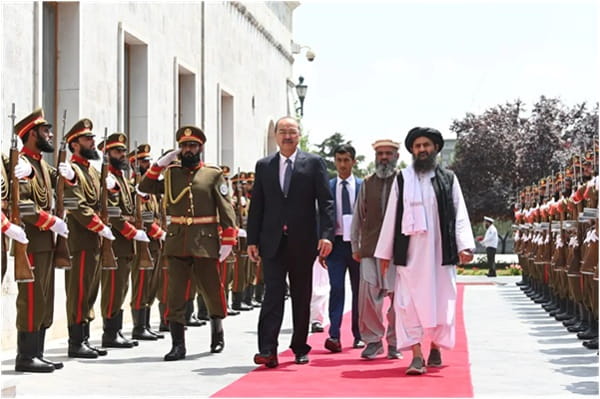
India’s Finance and Corporate Affairs Minister Nirmala Sitharaman (L) meets President of the Republic of Uzbekistan, Shavkat Mirziyoyev in Samarkand, September 2024. | PTI/The Hindu.

Today, Central Asia, including Uzbekistan, is undoubtedly of strategic importance to India for several reasons, among which energy security is of paramount importance. This necessitates strengthening India's ties with the states of this region, which are rich in natural resources, especially hydrocarbons. In addition, Central Asia is a promising market for Indian goods and technology and the development of trade and investment ties can contribute to the economic growth of both sides.
Introduction
The people of Central and South Asia have historically lived in a common political, economic and humanitarian space for a long time which has enriched their mutual cultural ties. This process, however, was disrupted and significantly limited in the mid-19th century as a result of the ‘Great Game’ - the geopolitical rivalry between British India and Tsarist Russia. But despite the artificial isolation of the two regions for almost a century and a half, the historical memory of the people of Central Asia has preserved the feelings of openness, friendliness and trust towards India, the key country of South Asia.
This fundamental determinant still underlines today's full-blooded bilateral Uzbek-Indian relations established after the Central Asian republics declared independence in 1991. The emergence of new countries on the political map of the world at the centre of Eurasia, detached from the rest of the world, has largely changed the political landscape of Central and South Asia.
Differences in the political systems and economic development models of the Central Asian countries, unresolved long-standing border, water and energy issues and a one-sided approach to resolve the problems without taking into account the interests of neighbouring countries has been responsible for hindering sustainable development both for individual countries and for the Central Asian region as a whole. The global economic crisis and the aggravation of the Afghan conflict further posed challenges for regional security and stability.
Regional Cooperation
This situation continued until the end of 2016, when Shavkat Mirziyoyev was elected as the new President of Uzbekistan, who initiated social, economic and political reforms in the country. These are also reflected in his foreign policy which has inherent principles of tolerance and accommodation for enhancing regional cooperation, integration and development. Central Asia was declared a priority of Uzbekistan's foreign policy and its goal was to improve relations with neighbouring countries through the resolution of all long-standing problems on the basis of mutually acceptable compromises. This course was based on the understanding that the sustainable development of the country and the region as a whole is impossible without joint efforts to solve common problems.
The result of this renewed foreign policy of Uzbekistan has been the creation of a new atmosphere of mutual understanding and cooperation in the region. Today, this cooperation is reflected in the "Central Asia-2040" Concept adopted at the Sixth Consultative Meeting of the Heads of the Five Central Asian States in August 2024. The Concept expresses the common vision of Central Asian countries for the development of regional cooperation in a new format.
Regional cooperation and integration, the growing role in international organisations, efforts to jointly address environmental and social issues, and the diversification of international ties of the countries of the region beyond relations with major neighbours such as Russia and China demonstrate the ability of Central Asian countries to participate in contemporary international relations and the world economy, promoting interregional cooperation, particularly with South Asia.
Centrality of India in South Asia
The key country in this region is the Republic of India, with which the development of relations has always been smooth and seamless, based on a solid legal framework, primarily the "Joint Statement on Strategic Partnership" signed in May 2011. However, Tashkent's renewed foreign policy and positive changes in the region, as well as the summit meetings of the leaders of the two states, Shavkat. M. Mirziyoyev and Narendra Modi in September-October 2018 and January 2019 gave a new impetus to further development of relations in bilateral and multilateral formats.
One of the results of these steps was the successful development of the India-Central Asia Dialogue established in Samarkand at the meeting of the Foreign Ministers of Central Asia and India in January 2019. Nevertheless, an objective look at the development of trade, economic and investment cooperation between Uzbekistan and other Central Asian countries and India suggests that it is much less than the existing potential. India has long refrained from actively expanding cooperation with Central Asia and Uzbekistan.
In our view, the reasons for this approach include the lack of geographical accessibility between Central Asia and India, which impedes the development of economic relations; India's foreign policy focus on other regions and strengthening ties with neighbouring South Asian countries and strategically important partners in the West; political and economic instability in some countries of the region, as well as the Afghan conflict, which blocked the connectivity of the two regions. However, these factors have not prevented other leading countries from actively engaging with Central Asian states.
In these conditions, the isolation of Uzbekistan and other Central Asian countries from maritime sphere and the need to open new transport corridors in order to strengthen economic security and access to new markets has triggered a new strategic vector of Uzbekistan’s foreign policy announced in July 2021 at an international conference in Tashkent which was dedicated to connectivity between Central and South Asia. In fact, it was a clear signal of the readiness to develop and expand cooperation with the countries of South Asia despite the obstacle of an unstable Afghanistan.
Uzbekistan’s Afghanistan Policy
A significant factor has been the change in Uzbekistan's foreign policy after the Taliban came to power in Afghanistan in August 2021. An assessment of the real contemporary situation in Afghanistan has shown that the Taliban managed to stop the civil war that lasted for more than forty years. However, the fall of the republican government and the elimination of virtually all democratic achievements in the country led to the cessation of international financing and the freezing of the country's funds in Western banks. In this situation, Afghanistan found itself in the deepest economic and humanitarian crisis.

Prime Minister of the Republic of Uzbekistan, Abdulla Aripov (L) during his Afghanistan visit in August 2024. | The Government Portal of the Republic of Uzbekistan.
To prevent the collapse of Afghanistan, Uzbek President Shavkat Mirziyoyev called for unfreezing nine and a half billion dollars of Afghan funds and assisting Afghanistan in solving social problems as early as September 2021. A little later, at the 76th session of the UN General Assembly, Uzbekistan called for preventing the isolation of Afghanistan as it would be left alone with its problems leading to unpredictable consequences.
Uzbekistan's position on Afghanistan has been repeatedly reflected in statements by official representatives, in particular the Special Representative of the President, A. Kamilov. He has highlighted that first of all, “there is a need to maintain a constructive dialogue with the new authorities of Afghanistan in order to avoid the repeated transformation of this long-suffering country into a so-called rogue state". He has also highlighted "the need to ensure a humanitarian corridor to Afghanistan in order to prevent a humanitarian catastrophe".
Uzbekistan also supports the adoption of measures by the international community to lift sanctions imposed on Afghanistan, unfreeze its assets and help rebuild the country's banking system, development of a post-conflict strategy and involvement of Afghanistan in regional economic integration initiatives. At the same time, Uzbekistan expects that "the new Afghan authorities will fulfil their international commitments: the establishment of an inclusive government, the fight against terrorism and drug trafficking, not providing shelter to terrorist groups on Afghan soil and the cessation of contacts with them, the support of good-neighbourly relations with the regional countries and the observance of fundamental human rights and freedoms, including those of women and national minorities.
India, Uzbekistan and Regional Economic Initiatives
In our view, Afghanistan, which is a bridge between Central and South Asia, could become an area for joint efforts of Tashkent and New Delhi to maintain security and stability in the country and its involvement in interregional cooperation. At the same time, India is expected to use its authority and influence in the United Nations and other leading global forums for enhancing regional cooperation between Central and South Asia.
Today, Central Asia, including Uzbekistan, is undoubtedly of strategic importance to India for several reasons, among which energy security is of paramount importance. This necessitates strengthening India's ties with the states of this region, which are rich in natural resources, especially hydrocarbons. In addition, Central Asia is a promising market for Indian goods and technology and the development of trade and investment ties can contribute to the economic growth of both sides.
Moreover, India is interested in the development of the key International North-South Transport Corridor (NSITC). In this regard, active utilisation of the Chabahar port with access to Afghanistan can become a key link in this project and will improve access to markets in Central Asia, other CIS countries and Europe.
Another important basis for the development of bilateral cooperation between New Delhi and Tashkent is security and counter-terrorism and counter-narcotics trafficking, which require coordinated efforts.
Security cooperation between India and the Central Asian countries will only contribute to enhancing regional stability. Undoubtedly, both sides are interested in further development of long-term partnership, utilisation of untapped potential, and expansion of cooperation in political, economic, investment, cultural and humanitarian spheres.
At the same time, the strengthening and expansion of bilateral relations and active cooperation in building interregional interconnectivity will face challenges on connectivity issues and logistics. The lack of well-developed banking and financial links and differences in trade policies of the regional countries may pose some obstacles for economic cooperation.
This list of challenges can go on. However, it needs to be emphasised that our Central and South Asian space is incredibly dynamic. Its full potential can be achieved by timely and concerted efforts to strengthen, first and foremost, political dialogue supported by practical steps. And today, speaking about the prospects for the development of interregional cooperation between Central and South Asia, I would like to quote the words of the great Indian leader Mahatma Gandhi, who once said: "The future depends on what we do in the present".
(Exclusive to NatStrat)